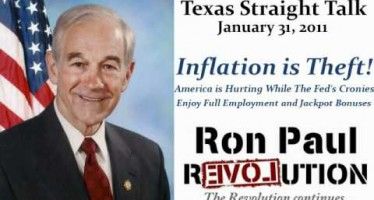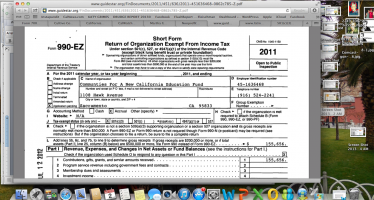AB32 driving higher energy costs

MAY 11, 2010
By SUSAN M. TRAGER
May 3 saw 807,946 signatures submitted to the California Secretary of State to qualify for the November ballot the California Jobs Initiative. If approved by voters, it would suspend AB32, the Global Warming Solutions Act of 2006, until unemployment in California dropped from its current high level, 12.6 percent in March, to 5.5 percent or lower for four consecutive quarters. AB32 supposedly would reduce global warming caused by greenhouse gases.
The campaign over the new anti-32 initiative already is hot and heavy. Both sides claim their position would save jobs or create jobs, while their opponent’s position would kill jobs.
Opponents of the initiative are directing their campaign against two Texas companies, Tesoro and Valero Energy Corp., that are helping fund the initiative.
“The Texas Oil Companies’ Dirty Energy Proposition will allow polluters to avoid our state’s clean energy standards, kill competition and jobs from California’s emerging clean technology companies, and keep us addicted to dirty, costly oil,” reads the front page of their Web site, whose URL also describes their position: www.StopDirtyEnergyProp.com/
The URL of the site favoring the initiative also is revealing: SuspendAB32.org. Its front page argues,
We must take action or economists say AB32 will:
*Cost California up to 1.1 million jobs.
*Cost the average family $3,857 a year in greatly increased expenses for housing, transportation, food and energy.
Both sides cite economic studies to make their points.
In particular, the initiative would suspend the best-known feature of AB32, its requirement to reduce greenhouse gases statewide by 25 percent by 2020. But there also are some relatively unknown aspects of AB32 that voters need to examine.
AB32’s energy cost
Consider that AB32 required the California Air Resources Board to develop a Scoping Plan for implementing the legislation. According to that Scoping Plan, “Based on Governor Schwarzenegger’s call for a statewide 33 percent RPS [Renewables Portfolio Standard], the Plan anticipates that California will have 33 percent of its electricity provided by renewable resources by 2020, and includes the reduction of greenhouse gas emissions based on this level.” (p. 45).
This 33 percent goal is affirmed in CARB’s March 24, 2010 “Updated Economic Analysis of California’s Climate Change Scoping Plan” (pp. ES-1, 26), which generally found that AB32 would help California’s jobs growth.
So, how much would that 33 percent goal cost? Well, in June 2009 the California Public Utilities Commission issued a report, “33% Renewables Portfolio Standard Implementation Analysis Preliminary Results Report.” It found the following “Projected Energy Costs in California in 2020 (p. 22):
Total Statewide Electricity Expenditures:
2008: $36.8 billion
All-Gas Scenario in 2020: $49.2 billion
20% RPS Reference Case in 2020: $50.6 billion
33% RPS Reference Case in 2020: $54.2 billion
(RPS = Renewables Portfolio Standard.)
“All-Gas Scenario” is where almost all electricity would be generated by natural gas-powered generation, which today in 2010 also is the predominant form of generation. The rise in cost for the “All Gas Scenario,” from $36.8 billion in 2008 to $49.2 billion in 2020, takes into account projected increases in population, business use and the cost of natural gas. So, the $49.2 billion figure is the base figure to use.
They key is this: The “33% RPS Reference Case in 2020” cost is projected to be $54.2 billion – that is $5 billion above the $49.2 billion base figure.
Effect on water costs
That extra cost of “only” about 10 percent would ripple throughout the economy. Consider my specialty, water.
Reported the just-released California Water Plan Update 2009, which is produced by the California Department of Water Resources, “According to the California Energy Commission, water-related energy use in California consumes approximately 20 percent of the state’s electricity….” (p. 4-38)
Now, if overall energy costs go up 10 percent, that means the energy costs of “water-related energy use” would rise from 20 percent to 22 percent of the state’s overall water cost – a 2 percentage point increase. That might a drop in the bucket, but if you’re a business that uses a lot of water, such as a factory or farm, a $200,000 monthly water bill could go up by $4,000, meaning you would have to fire one worker – adding to already high state unemployment and putting another burden on state social services costs.
Then consider another initiative on the November ballot, the California Water Bond Proposition. If it passes, it would borrow $11.1 billion to build numerous water projects throughout the state. The bond stipulates it would build, “Water recycling and related infrastructure … . Local and regional conveyance projects that improve water supplies … . Local and regional surface water storage projects that provide emergency water supplies and water supply reliability in drought conditions,” etc.
These are projects that require concrete and construction equipment. “Implementation of AB32 will cause increases in the cost of cement anywhere from 10-50% (depending for example on cap/trade auction prices) and of course the cost of diesel to run dozers in building infrastructure,” Tom Tanton told me; he’s president of T2 & Associates and former principal advisor to the California Energy Commission.
“Cap/Trade” refers to the “cap-and-trade” aspect of AB 32. CARB explains, “Under cap-and-trade, an overall limit on GHG [greenhouse gas] emissions from capped sectors will be established by the cap-and-trade program and facilities subject to the cap will be able to trade permits (allowances) to emit GHGs.”
Voters will decide
In these times of tight budgets, high unemployment and citizen resistance to waste and high taxes, AB32’s impact on the water bond will be a critical factor in the election. If AB32 raises construction costs, as I think the evidence shows, then it would cause fewer water projects to be built under the new bond.
However, if AB32 is effectively suspended, then those projects would cost less; meaning more money from the bond would remain to be used for other state water projects.
As the election approaches, the fate of the water bond may depend on the fate of AB32. If polls show that AB32 may effectively be repealed, then the bonds – by constructing more projects for every buck – may be more likely to pass.
Susan M. Trager has more than 30 years of experience in water law, public agency law, municipal law, environmental law and eminent domain law, including the valuation of water rights. She also edits Trager Water Report, a new site on California water. And she earlier wrote “Draconian water plan unveiled” for CalWatchDog.com.
Her email: [email protected]. The views in this article are hers, and do not represent those of her law firm, SmithTrager LLP.
Related Articles
Steve Lopez Myopia on Oil
FEB. 4, 2011 by JOHN SEILER L.A. Times columnist Steve Lopez this week enthuses for bikes, buses and the potential
‘Fire Sale’ Prices Can’t Save Chevy Volt
MARCH 5, 2012 By JOSEPH PERKINS Wouldn’t you know it: No sooner did General Motors start shipping its Chevrolet Volt
Do union activists work for Gov. Brown, farm board?
SACRAMENTO — The revolving door among political consultants, community organizers and state government revolves right into the governor’s office and the Agriculture




